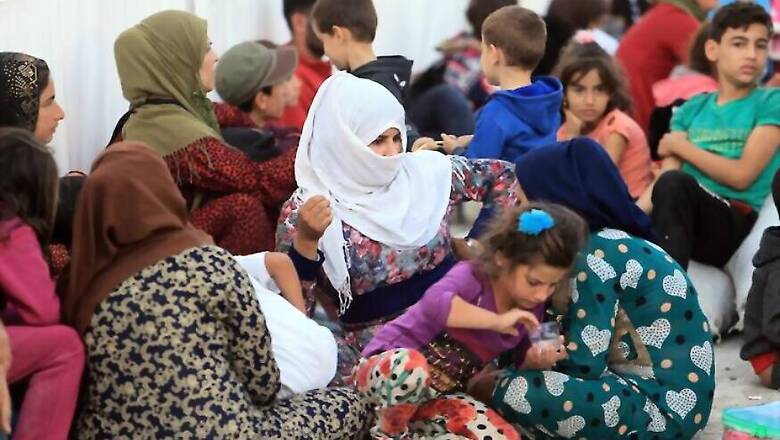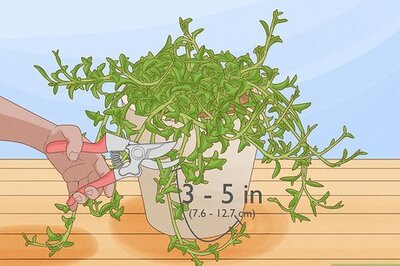
views
As the coronavirus pandemic takes its toll, it has triggered a mixed bag of memes. Some include people piling on extra pounds in lockdown, in stark contrast to the harsh realities of food scarcity in the developing world. The coronavirus outbreak has created a food security crisis as it threw labour markets and supply chains into disorder, exposing West Asian states in particular to stark hunger and poverty. Quarantine regulations have disrupted trade routes and caused a derangement of supply and demand. With anti-Chinese sentiment growing, a few countries in West Asia have expressed reluctance to import food products from China. This is paving the way for rising food export opportunities available to Indian businesses.
The World Bank, along with the Food and Agricultural Organisation of the United Nations (UNFAO), the International Fund for Agricultural Development, and the World Food Programme (WFP) delivered a joint appeal for “collective action to ensure that markets are well-functioning.” The FAO commented: “Both lives and livelihoods are at risk from this pandemic. Border closures, quarantines, and trade, supply chain disruptions could restrict people’s access to sufficient, diverse and nutritious sources of food, especially in countries hit hard by the virus or already affected by high levels of food insecurity.” West Asian states in particular, are known as large net importers of food, and are thereby highly exposed to an increase in food price inflation caused by trade disruptions.
To discuss the challenges posed by COVID-19, Saudi Arabia convened a virtual interface between agriculture ministers of G20 countries and the World Trade Organisation (WTO) on 21 April, in which the WTO called for “unrestricted trade in food, farm products and medical products.” In consonance with the G20 leader’s statement on the coronavirus outbreak, the joint statement said that the WTO and G20 agricultural ministers are committed to “ensure the continued flow of food, products and imports essential for agricultural and food production across borders” as a measure to “safeguard global food security and nutrition.” This meeting was organised immediately after countries started imposing food export restrictions to ensure domestic food supply, as droughts and expanding public demand stress supply chains amid the virus outbreak. Already, prices for rice imports have reached a seven-year high and the cost of wheat has spiked, as net food-importing states like Saudi Arabia, Egypt, Algeria, and Turkey went on a stockpiling spree for the future. This has squeezed smaller, more vulnerable countries in the region.
Hunger Crisis Denting Efforts Against Epidemic
War-torn countries like Syria and economically unstable Iran and Lebanon are among the most hard-hit countries in West Asia. Food prices in Syria have doubled in the past year due to the novel coronavirus and rampaging military activity. Sanctions on Iran had already damaged the country’s economy and created food insecurity; the virus outbreak has only added to the misery. Millions of Lebanese are at high risk of hunger due to the coronavirus-related lockdown. With a looming financial crisis pre-dating the virus outbreak, it has been estimated that the poverty rate in Lebanon will increase to a whopping 50% in 2020 from 33% in 2019. In Palestine, as many as 53,000 new Palestinian households have fallen below the poverty line due to COVID-19, taking the total number of households living in poverty to 115,000 (with 80,000 from Gaza). These rising poverty levels have direct implications on the hunger crisis in the region, denting governments’ efforts in the fight against the epidemic. Social Affairs Minister Ahmad Majdalani at a press conference in Ramallah said that “these figures could increase by the end of the month.”
India’s food aid to West Asia
At a time when countries are halting trade with China, Indian exporters of agri-goods have seen a wave of export opportunities come their way. India stands a good chance to benefit from the shift in global trade triggered by the pandemic, and could fill in the vacuum by supplying West Asian countries which traditionally relied on Chinese agro-imports. “The COVID-19 crisis opens up huge opportunities for Indian products to capture a major share of exports given the anti-China sentiment permeating global relations in trade,” opined Harsimrat Kaur Badal, Union Cabinet Minister of Food Processing. The Gulf States are highly dependent on food imports, with imports making up about 80% to 90% of their total demand. India is one of the key exporters of food items to West Asian countries, and many countries, especially from the Gulf region, have recently arranged airlifts of food consignments from India.
Uninterrupted supply of food and essential items from India to West Asia has been high priority for the MEA. In a recent move, Bahrain’s flag carrier Gulf Air was deployed to assist the Kingdom in securing food amidst the crisis by picking up a ‘special food consignment’ from India. Other than this, under G2G agreements and on special demand from countries, India’s agri-cooperative NAFED exported 40,000 tons of grain to Lebanon.
Due to the festive season of Ramadan, demand for India’s Basmati rice has been also very high. “Basmati exports to most traditional overseas markets have surged in the last quarter, due to increased demand fuelled by stockpiling due to COVID-19. The rise in demand from West Asia has also been buttressed by higher buying for Ramadan, according to the All India Rice Exporters Association. West Asian states like Saudi Arabia and Iraq, which depend mostly on food imports, have seen imports grow by 20-30 percent in 2020. More enquiries for food imports have been received by India from West Asian states like Kuwait and the UAE.
As most countries banned food exports and lockdowns stunted oil demand, the Gulf has particularly been hit hard. The region is moving towards troubled times with rising poverty and a brewing hunger crisis in countries like Lebanon, Palestine, Iran, Syria, etc. The West Asian states must do everything in their power to keep trade routes open and negotiate with countries for ensuring functional supply chains. India would do well to step in and take charge, as a net food security provider to West Asian states, filling the void created by the fall in demand for Chinese goods.
The author is a Research Intern at ORF Mumbai. Views expressed are personal.




















Comments
0 comment